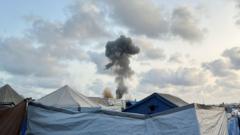The devastation unfolded overnight, with Israeli warplanes launching multiple attacks throughout various locations, including a school and a fuel station, both of which housed displaced families. The Hamas-run civil defense agency highlighted that rescue efforts were severely challenged by the ongoing bombardment and the lack of necessary equipment to assist the injured.
This latest wave of air strikes comes in the context of a broader Israeli military operation, which has ramped up following an evacuation order for Gaza's civilian population. This order precedes what Israeli officials are describing as an "unprecedented attack" aimed at dislodging Hamas. Among the casualties, reports indicate ten fatalities at the Musa bin Nusayr School, which was sheltering hundreds of displaced individuals, along with 15 deaths at a fuel station in Nuseirat, and another 13 in Deir al-Balah due to a targeted family home strike.
Multiple air strikes have also struck the Shujaiya neighborhood in eastern Gaza, which witnesses have reported as producing tremors akin to those of an earthquake, with the intent of targeting Hamas’s extensive network of underground tunnels. The international response has grown increasingly critical, with leaders from the UK, France, and Canada denouncing Israeli Prime Minister Benjamin Netanyahu's declarations of territorial control in Gaza. Netanyahu himself dismissed these international concerns as advantageous for Hamas.
In a contrasting stance, Israel announced it would allow for a limited amount of food supplies into Gaza, marking a potential easing of an 11-week blockade, though UN authorities have cautioned that this gesture scarcely meets the region's overwhelming needs. Since the beginning of the conflict—triggered by Hamas's attacks on Israel on October 7 that resulted in the deaths of about 1,200 individuals—at least 53,486 Palestinians are reported to have died, according to the Hamas-controlled health ministry.
This latest wave of air strikes comes in the context of a broader Israeli military operation, which has ramped up following an evacuation order for Gaza's civilian population. This order precedes what Israeli officials are describing as an "unprecedented attack" aimed at dislodging Hamas. Among the casualties, reports indicate ten fatalities at the Musa bin Nusayr School, which was sheltering hundreds of displaced individuals, along with 15 deaths at a fuel station in Nuseirat, and another 13 in Deir al-Balah due to a targeted family home strike.
Multiple air strikes have also struck the Shujaiya neighborhood in eastern Gaza, which witnesses have reported as producing tremors akin to those of an earthquake, with the intent of targeting Hamas’s extensive network of underground tunnels. The international response has grown increasingly critical, with leaders from the UK, France, and Canada denouncing Israeli Prime Minister Benjamin Netanyahu's declarations of territorial control in Gaza. Netanyahu himself dismissed these international concerns as advantageous for Hamas.
In a contrasting stance, Israel announced it would allow for a limited amount of food supplies into Gaza, marking a potential easing of an 11-week blockade, though UN authorities have cautioned that this gesture scarcely meets the region's overwhelming needs. Since the beginning of the conflict—triggered by Hamas's attacks on Israel on October 7 that resulted in the deaths of about 1,200 individuals—at least 53,486 Palestinians are reported to have died, according to the Hamas-controlled health ministry.










